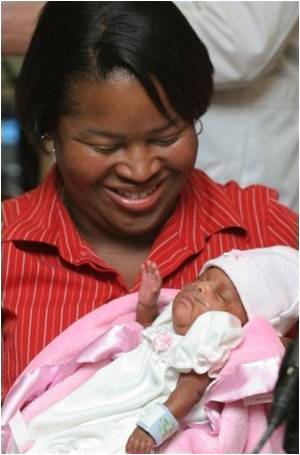
Amawadia Adem, who travelled from her village to the region's only hospital in Aweil, gave birth with the efficiency and aplomb of a three-time mother and looked set to leave the delivery room as quickly as she came in.
As the mother was still under observation on her delivery bed, Janet Fields, a midwife with Medecins Sans Frontieres (Doctors Without Borders-MSF), noticed that she was beginning to bleed heavily.
"Postpartum haemorrhage, number one cause of maternal death," she says, calling out the names of drugs and utensils to two south Sudanese nurses assisting her in the MSF-run maternity that day.
South Sudan voted for its independence from the north in January and, in July, when a six-year transition period that ended decades of civil war expires, it is set to become the world's 193rd nation.
However, it will also take the 193rd and last spot in global maternal mortality rankings.
Advertisement
Goal five of the UN Millennium Development Goals includes a target to slash maternal mortality rates by three quarters by 2015.
Advertisement
Aweil has the only hospital in south Sudan's Northern Bahr al-Ghazal state and the trip can take two days by road for some of the most isolated villagers.
Only 10 percent of births are attended by a skilled professional in southern Sudan, where most women continue to resort to traditional birth attendants.
According to MSF, access to skilled staff, drugs and equipment have reduced the maternal mortality rate of 14 percent prevailing in the region to just 0.6 percent in Aweil civil hospital.
In the delivery room, Janet Fields and her team have brought Amawadia Adem's haemorrhage under control.
"Hallelujah! No bleeding," she exclaimed, pumping her surgical-gloved fist in the air as the young mother lay on her side to recover.
When asked what would have happened to Amawadia if she hadn't come to deliver at the hospital, Fields answered without hesitation.
"She would have died. Even if the traditional birth attendant knows certain moves, she needed drugs," the midwife said.
The hospital's maternity witnesses a tiny proportion of the area's births but the ever-growing crowds at the antenatal care unit suggest that habits are beginning to evolve.
"There is a great change... Before, mothers did not have care," said unit supervisor Alice Gune Patumayo.
Some 200 pregnant women sit patiently in a rudimentary outdoor waiting area consisting of a patchwork of straw mats littered with rubber flip-flops.
A blind netting stretched above them to repel the punishing sun casts meshed shadows on their multicoloured clothes as the supervisor calls out names through a loudspeaker.
The local staff take heart in the knowledge that most out-patients who have sought antenatal care here are likely to want to give birth in the hospital's maternity.
"They are beginning to understand it... They have learnt about this place and some walk five hours or drive for two days to come here," said maternity supervisor Joseph Atak Bol.
In a south Sudan pregnant with statehood, the semi-autonomous government has recognised the need to improve the chances of survival for expectant mothers, inviting various NGOs to launch projects aimed at curbing maternal mortality.
In one such project, the UN Children's Fund and the Western Equatoria state donated seven purpose-built sidecar motorcycles meant to enable faster and more comfortable transport for pregnant women facing emergencies.
Enhanced maternal care will inevitably cut child mortality as well, helping south Sudan to beat the odds and carve out a better future.
In the Aweil hospital maternity, 18-year-old Anguet Aten cradles her baby boy Akol, born hours earlier.
"I was in labour at home for three days and I tried with the assistance of a traditional birth attendant but it didn't work, so I decided to come here," Anguet said.
"I ended up bleeding a lot so it would not have been good. Next time, I'll come here directly."
Source-AFP









